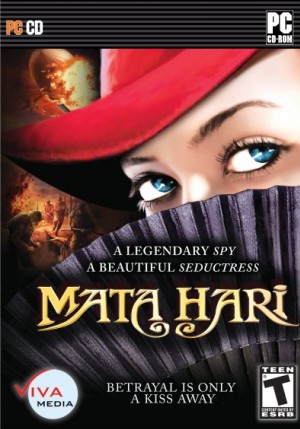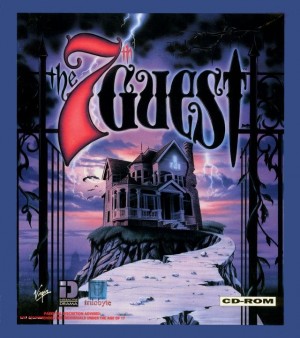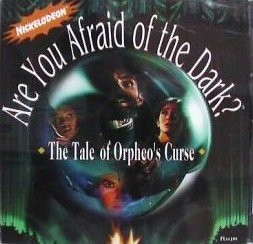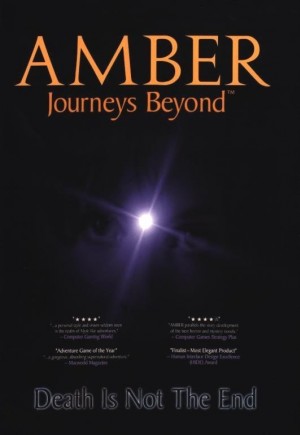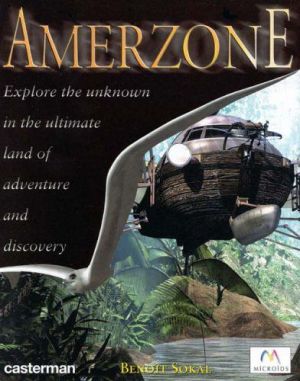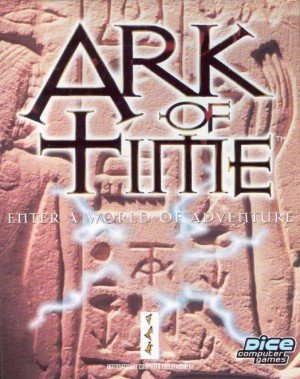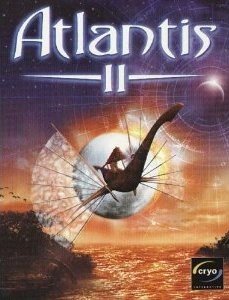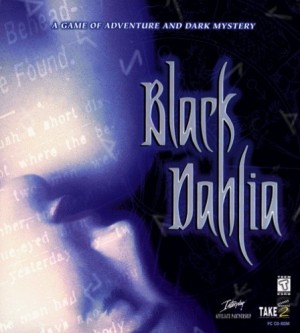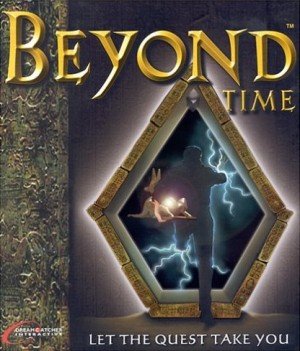Hal Barwood - Mata Hari interview
"We wanted to have elements that feel dynamic, that make you feel that your experience is 'my experience'."
 Indiana Jones and the Fate of Atlantis is, to this day, still considered one of the finest adventure games ever made. The globe-trotting adventure gave players the choice between three parallel paths, each with an emphasis on different gameplay, interspersing challenging puzzles with point-and-click minigames involving fistfights, balloon rides and car chases. Fate of Atlantis continues to pop up in many 'best of' lists and was featured at number six in our very own Top 20 Adventure Games of All Time (published in 2002).
Indiana Jones and the Fate of Atlantis is, to this day, still considered one of the finest adventure games ever made. The globe-trotting adventure gave players the choice between three parallel paths, each with an emphasis on different gameplay, interspersing challenging puzzles with point-and-click minigames involving fistfights, balloon rides and car chases. Fate of Atlantis continues to pop up in many 'best of' lists and was featured at number six in our very own Top 20 Adventure Games of All Time (published in 2002).
Alas, its co-creators Hal Barwood and Noah Falstein did not continue to make adventure games at LucasArts; both of them left the company to set up their own game design consulting firms. Now, fifteen years after the release of Fate of Atlantis, German publisher dtp is bringing Falstein and Barwood back for a whole new project: the espionage adventure Mata Hari. The game was prominently featured at this year's Games Convention in Leipzig, where we were able to get some first hands-on impressions. While Mata Hari reminded us in some ways of the classic games of yore, it also showed no signs of being stuck in the past, incorporating many interface evolutions and unique puzzle mechanics.
This is the interview we did at the dtp booth after seeing a demo of Mata Hari, in which Hal Barwood further explains the unique concepts underlying its inventory, how the game tracks players' scores, and much more. (It is recommended that you read our Mata Hari preview before continuing with this interview.)
AdventureGamers.com: Mata Hari has an interesting interface, particularly with regards to its multi-purpose inventory. What are the different types of objects that the inventory can contain?
Hal Barwood: There are actually two categories: actual objects and abstract concepts. Let's see if I can pick up an object to show you. [Picks up an object in the game.]
I noticed that icons in the inventory can have three different colors.
Yes, but there will be more than that. The colors are a vague form of identification that just help you sort in your mind what's going on. These tokens [inventory objects] start stacking up and tooltips will reveal exactly what they are about. But we want them to still function like real icons. They always start to suggest the ideas behind them.
The colors will probably be different in the final game, but the red ones are separated from the blue ones and the idea of the red ones is that they're sort of the tasks you need to do. [Points to the next set of colored icons.] And these are your arsenal of ideas. They get more complicated as you go along. [Points to the final set of icons.] And these are solid objects.
The icons will probably be further colored. For example, there can be travel tokens. You can go to four cities. You start in Paris where a lot of the game happens, but eventually you go to Berlin, Monaco and Madrid. There are minigames you have to play along the way to travel. But in order to travel, you need a character to tell you "go to Berlin" and then you get the Berlin token. So in Paris you can go out into the street and find a taxi and if you use the travel token, Mata Hari will say "take me to the train station". At the train station, you can use the same token on the ticket guy to go to Berlin. So the core meaning hasn't really changed -- I'm traveling to my destination -- but the specifics are actually kind of fluid. We think this is a really interesting advance in the way you structure the controls of an adventure game.
It appears to simplify the controls while making the underlying metaphors richer.
Yeah. And we can always do combinations within the inventory. We can even assemble ideas in there. It's pretty cool. So I think this is going to be a little bit different for adventure gamers. I know they are possibly the most conservative of all game players -- of all the orangutans who are skeptical of changes in their cages (laughs) -- they really don't want any changes at all.
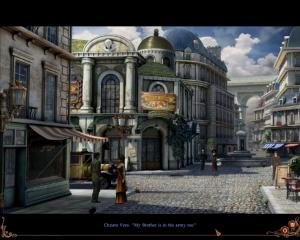 Maybe I shouldn't quote you on that, or they'll come after you with torches and pitchforks.
Maybe I shouldn't quote you on that, or they'll come after you with torches and pitchforks.
I know they will. I mean, I'm one of them, so I understand it. But we think this is something people will catch onto pretty quick and love. What I like about it is that in addition to streamlining the conversations and unifying them with everything else, dealing with a person becomes just like object manipulation. [Hal demonstrates a typical inventory puzzle]. I'm puzzling right now, I'm puzzling with objects. And, well, that kind of manipulation -- everyone is familiar with being active when you do that. You apply things to other things and see what goes on. In Mata Hari you do exactly the same in conversations so it feels very lively. It feels very much like being an active participant in the game as you try things on people in the same way you try things on other objects. So we're pretty excited.
What is it like going back to an old school adventure game having worked on action-adventures for many years? And Noah has worked or consulted on games of many different genres.
I haven't made a pure adventure game in fifteen years because, as you know very well, the market kind of fell out in the United States for this sort of thing and everybody stopped building them. And now they are making a comeback. We're fond of them, I think they have a very... (ponders for a while)... I like two things about them very much. The first one is that they are story-driven. That means actual character counts and the details of a story really mean something in an adventure game. I'm a storyteller at heart, so I like that very much. I also like the fact that there's something clean and whole and entire about an adventure game. It doesn't feel messy to me. It feels like a wonderful capsule of experience, like you would experience a book. It has a certain dimension that gets me involved [as a player] and when I go away it feels like I still know all about it and I feel attached to it. Whereas a lot of games are just very frustrating and I eventually give up. So I like that feeling too. I hope to do more of it.
 Given your strong storytelling angle, how do you feel about puzzles, especially in a time when people can easily find solutions on the internet?
Given your strong storytelling angle, how do you feel about puzzles, especially in a time when people can easily find solutions on the internet?
Yeah, GameFaqs.com huh? (laughs). I still think we should do puzzles because they are essential. But I'll say something: modern adventure games are built with budgets that are relatively constrained compared to what they were fifteen years ago. We can't do the three paths that I did in Indiana Jones, or all these elaborate locations -- we had 120 locations in Fate of Atlantis and we can't do that anymore.
One of the things we're doing in Mata Hari is that we have these sort of sidequests. They're little low-grade ministories that you can play. And we score the players. There are three different scoring systems we keep track of. There's spycraft, which is: are you alert to all the other spying possibilities and do you take advantage of them? We also track your wealth and then we also track skill. We'll be aware of whether you solve a puzzle easily or whether you did a lot of back and fro-ing or a lot of time spent or a lot of wrong answers. We'll score you on it so you're aware of how you're doing in the game. And for the completists of the world, who want to really get into the game and really really delve, we have some material that allows them to do that.
Mata Hari is a dancer, so one of the minigames that you can repeat is dancing. I guess adventure gamers will go "ooh that's really hard, I don't know if I can do that", but I think you can. You don't need a dancepad (laughs). But it's a game and it's rhythmic so you do actually have to... do stuff. Some of the dancing is to solve puzzles, like to convince your dance manager. But he doesn't want your dancing to get stale, so if you danced already you must find another "inspiration" to dance. You run around the world finding things you can turn into dance moves. Then you can go back and dance and make money, which you can do voluntarily in addition to the puzzle solving.
In addition to that, our minigames are -- well, you asked about puzzles and how you can go online and solve them -- a lot of puzzles are actually redoable. I'll give you an example. We have a travel game where there's six pairs of cities you can travel between, some of them much harder than others, but in every case you're trying to get from one city down a set of tracks that you can choose to another city. There are agents working at the various stations and they're following you. If they actually catch up with you, they set you back to the beginning.
Some of the nodes of the cities you go through to your destination are blocked or out of order, which changes from trip to trip. The overall idea is always the same but the actual tactics you're going to have to use will be different each time. You'll gradually get what are basically power ups. For instance, marking nodes as safe havens will prevent agents from going there. If you pick the right one, it's very helpful to get through. Then you can get express tickets, which give you an extra turn. If I play that in the wrong spot, it won't do me any good. But if I'm careful where I put that, and then I start my travels, I will be able to beat the agents. It gradually gets harder. First it's one agent, then two, then three. It's turn-based, it's sort of a... semi-actual game. It takes moves and yet it's very puzzley. Every time you look at it, it's a new puzzle.
We wanted to have elements that feel dynamic, that make you feel that your experience is 'my experience'.
It is a pure adventure game, correct? There's no action in it -- or at least, not any obligatory action?
The only obligatory action is that -- in a low-grade, fairly easy way -- you have to master some rhythmic stuff when you are dancing. It will be fine. We hope it will be fun. And there are a number of other minigames.
The early 20th century was a time of rapid technological change and advancement just like now. Things like airplanes, radios, and telephones were still very new -- and they were all tools and objects of spying. So you have to learn how to use a telephone in the game and of course there are decoding minigames in which you have to decode messages. That's another set of minigames. I think they'll all be a little different for players.
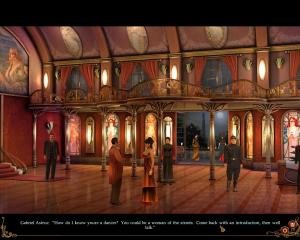 Sounds interesting. So who came up with the premise of the game? Did dtp develop it?
Sounds interesting. So who came up with the premise of the game? Did dtp develop it?
Here's how it worked. I got an e-mail saying: would you maybe like to do a game with us? So I met with a guy named Marc Buro, he's a producer at ftp. Marc met me at E3 and said, "we wanna do this spy game". He was reluctant to tell me who it was really about, but eventually he said, "Mata Hari". He also approached Noah, my co-designer from Indiana Jones and the Fate of Atlantis, but I don't think he knew we were friends.
The last time Noah and I really collaborated was on Fate of Atlantis, but we've been friends for twenty years. We live about five miles apart in Marin County, California. When Noah and I were comparing notes we realized [that dtp had contacted them both], so we said, let's see if they want to do it with us together. We went back to them and they thought it was a good idea. So the original idea was not that complicated. It's "Mata Hari spying". That's what they came to us with. We cooked up the design around the story, and fleshed that out into a full game design, and now we're writing the dialog for it.
It's interesting that you're co-developing it in America with 4Head Studios in Germany. The distance between you and the developers must be a challenge.
Well, only that your ears fall off from using a Skype headset all day. A lot of the design and a lot of their work goes up on a wiki. I've got a couple of machines at home: I've got the wiki up on one and I'm running skype on my other one, so we have conferences with the producer and the guys at 4Head, and with Noah down the road. We might spend hours talking online. It's pretty active and this is also my fourth trip over to Germany. So we get to talk a bit face-to-face and be in the same timezone, but that's pretty rare.
Okay, I've got to ask you: do you ever get sick of people asking you questions about Indiana Jones and the Fate of Atlantis? I always wondered that, because ... I mean, do you mind people still bringing up things like the three paths after so many years?
(laughs) No, I'm very flattered. Listen, I had one of the greatest days of my life yesterday. I had to go over to the ANACONDA booth, which is the German brand dtp uses. I'm over there telling about the game and there was going to be this whole signing thing. So we go over and we're doing it. And ... look, I am so cool, that the booth babes wanted to have their picture taken with me. (laughs) I was like, "wow, this is the opposite of geekdom!". Anyway, I'm not at all bothered about it.
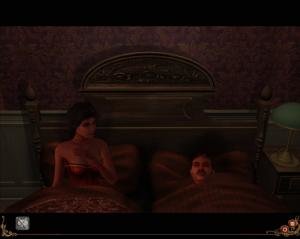 It's great that a lot of former LucasArts designers have gone back to making adventures.
It's great that a lot of former LucasArts designers have gone back to making adventures.
Yeah, there's quite a few of us. Bill Tiller is doing A Vampyre Story with Crimson Cow, Dave Grossman is busy doing Sam & Max at Telltale and -- Ron's game is going to be more of an RPG, I think. It's an idea that's been in his head for many years.
Anyway, it's nice because I think Germany is sort of leading the way back.
Yes, it's quite remarkable how many German publishers here at GC are publishing adventure games.
I hope it doesn't lead to a collapse. I would guess the biggest threat to Mata Hari would actually be games like Memento Mori or Gray Matter, or whatever games are going to be next.
Right. Although you'd hope that the games also gradually expand the audience, with new people discovering the genre.
One of the things that killed the genre was that -- well, back in the day that Fate of Atlantis came out, the genre was alive and well and Indiana Jones fit into that. But the truth is, that game was more in your head than it was on the screen. The Jones character was fifty pixels tall and was just this little guy running around the screen. It was the very first game LucasArts ever published with 256 colors -- that was like, "wow!". It was hard to feel that it was truly an engaging experience. Now we've got all this beautiful art, and I think that's part of it. You can say "this is a character" now [points to characters on screen] and people will say "yeah, it really is". I think that's going to help lead the way back.
What do you think about the DS and the Wii?
I don't know about the Wii. It's true that the Wii has a broader base in general than consoles usually do, and Nintendo is very clever with that, but the DS is the way to go. Everybody has got them, and I know especially -- at least in America -- I have a lot of female friends who have DSes.
Yeah, same for me.
And a lot of games that are prominent on the DS are kind of thinking games. Brain Training games especially, but also Sudoku and Picross are all coming out on DS.
It turns out that there's another connection that runs through casual games. I don't know what it's like here but in America it's a huge phenomenon. I guess the term is silver gamers. There's just a lot of older people who have discovered that they like to play these games. I think that's a connection and the next step from there is adventure games. That builds an audience for us too.
And with that, our chat came to an end, as a camera crew that had been busily setting up their gear at the dtp booth was now ready for their turn to interview Hal. Mata Hari is set for release Q1 2008 in Germany, Austria and Switzerland, and later in 2008 for other territories, and we'll continue to keep an eye on this promising title.



